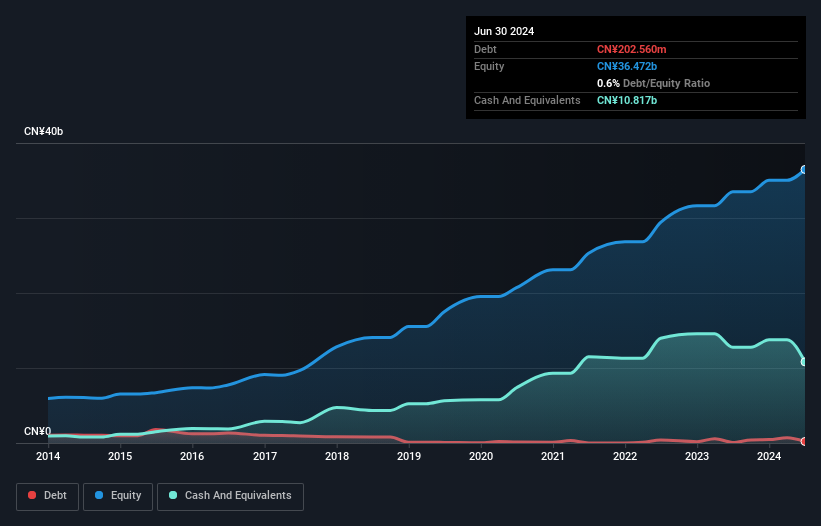Here's Why CSPC Pharmaceutical Group (HKG:1093) Can Manage Its Debt Responsibly
Some say volatility, rather than debt, is the best way to think about risk as an investor, but Warren Buffett famously said that 'Volatility is far from synonymous with risk.' So it might be obvious that you need to consider debt, when you think about how risky any given stock is, because too much debt can sink a company. As with many other companies CSPC Pharmaceutical Group Limited (HKG:1093) makes use of debt. But the more important question is: how much risk is that debt creating?
Why Does Debt Bring Risk?
Generally speaking, debt only becomes a real problem when a company can't easily pay it off, either by raising capital or with its own cash flow. Ultimately, if the company can't fulfill its legal obligations to repay debt, shareholders could walk away with nothing. However, a more usual (but still expensive) situation is where a company must dilute shareholders at a cheap share price simply to get debt under control. Of course, debt can be an important tool in businesses, particularly capital heavy businesses. The first step when considering a company's debt levels is to consider its cash and debt together.
Check out our latest analysis for CSPC Pharmaceutical Group
What Is CSPC Pharmaceutical Group's Net Debt?
As you can see below, at the end of June 2024, CSPC Pharmaceutical Group had CN¥202.6m of debt, up from CN¥75.3m a year ago. Click the image for more detail. But on the other hand it also has CN¥10.8b in cash, leading to a CN¥10.6b net cash position.

How Healthy Is CSPC Pharmaceutical Group's Balance Sheet?
According to the last reported balance sheet, CSPC Pharmaceutical Group had liabilities of CN¥10.4b due within 12 months, and liabilities of CN¥988.7m due beyond 12 months. Offsetting this, it had CN¥10.8b in cash and CN¥12.2b in receivables that were due within 12 months. So it can boast CN¥11.6b more liquid assets than total liabilities.
This excess liquidity suggests that CSPC Pharmaceutical Group is taking a careful approach to debt. Due to its strong net asset position, it is not likely to face issues with its lenders. Succinctly put, CSPC Pharmaceutical Group boasts net cash, so it's fair to say it does not have a heavy debt load!
The good news is that CSPC Pharmaceutical Group has increased its EBIT by 6.6% over twelve months, which should ease any concerns about debt repayment. There's no doubt that we learn most about debt from the balance sheet. But it is future earnings, more than anything, that will determine CSPC Pharmaceutical Group's ability to maintain a healthy balance sheet going forward. So if you're focused on the future you can check out this free report showing analyst profit forecasts.
Finally, a company can only pay off debt with cold hard cash, not accounting profits. CSPC Pharmaceutical Group may have net cash on the balance sheet, but it is still interesting to look at how well the business converts its earnings before interest and tax (EBIT) to free cash flow, because that will influence both its need for, and its capacity to manage debt. Looking at the most recent three years, CSPC Pharmaceutical Group recorded free cash flow of 42% of its EBIT, which is weaker than we'd expect. That's not great, when it comes to paying down debt.
Summing Up
While we empathize with investors who find debt concerning, you should keep in mind that CSPC Pharmaceutical Group has net cash of CN¥10.6b, as well as more liquid assets than liabilities. On top of that, it increased its EBIT by 6.6% in the last twelve months. So we don't think CSPC Pharmaceutical Group's use of debt is risky. When analysing debt levels, the balance sheet is the obvious place to start. But ultimately, every company can contain risks that exist outside of the balance sheet. To that end, you should be aware of the 1 warning sign we've spotted with CSPC Pharmaceutical Group .
When all is said and done, sometimes its easier to focus on companies that don't even need debt. Readers can access a list of growth stocks with zero net debt 100% free, right now.
Have feedback on this article? Concerned about the content? Get in touch with us directly. Alternatively, email editorial-team (at) simplywallst.com.
This article by Simply Wall St is general in nature. We provide commentary based on historical data and analyst forecasts only using an unbiased methodology and our articles are not intended to be financial advice. It does not constitute a recommendation to buy or sell any stock, and does not take account of your objectives, or your financial situation. We aim to bring you long-term focused analysis driven by fundamental data. Note that our analysis may not factor in the latest price-sensitive company announcements or qualitative material. Simply Wall St has no position in any stocks mentioned.
 Index Options
Index Options CME Group
CME Group Nasdaq
Nasdaq Cboe
Cboe TradingView
TradingView Wall Street Journal
Wall Street Journal